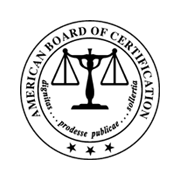
506 N. Armenia Ave. Tampa FL 33609 | 813-870-3100
What to expect at the initial consultation with counsel for bankruptcy:
You should expect to have counsel schedule an appointment to speak with you at some depth regarding your financial situation. The appointment may be in person, by phone, or video chat. Before meeting with counsel they should send you documents to sign required under the Bankruptcy Abuse and Consumer Protection Act, including a debt relief agency disclosures and a contract required for the consultation (which this can be signed within 5 days after the consultation, competent counsel will request it prior to the consultation). The contract should spell out whether there is any fee for the initial consultation. Many counsel offer a free initial consultation, which may be limited in the time allowed. However, a thorough initial consultation will usually take at least 30 minutes and could take over an hour. You should expect the consultation to be with experienced counsel rather than a paralegal.
Counsel should send you a list of information to be discussed during the consultation well before the consultation itself, to allow you to prepare the information needed for the consultation. This will include information as to your income, the income of anyone else in the household unit (whether or not they are filing bankruptcy). Information about your home, any other real estate owned, your vehicle including make, model, trim, and mileage, the amount owed on the home and the vehicle, when the home was purchased. Counsel will also inquire how long you have lived in your state and where else you lived for the last 3 years. This can affect what you are allowed to retain in bankruptcy. Counsel will inquire as to any debts to, or repayments to family or friends within the last year, or gifts to family or friends within the last 2 years. It is critical to be honest with counsel on this and all matters as it could affect obtaining the relief you seek.
Counsel will inquire as to the debts you have, with emphasis on alimony, child support, student loans, tax debts, and recent charges on credit cards. Counsel will also ask about any balance transfers or cash advances. Counsel will ask if you have filed bankruptcy before and when. If you do not have the dates at hand, counsel should be able to look this up. Counsel will ask if you are suing anyone, have the right to sue anyone, or anyone owes money to you. Counsel will inquire as to any pensions or retirement plans, and any loans against such plans. Counsel will ask about assets you own including guns, jewelry, household goods, or other assets.
Finally, counsel will ask if anyone is suing you. Depending on your answers, counsel may go into more depth on any of the subjects.
Counsel may or may not be able to give you a recommendation after the appointment, or may request additional documents and information before making a recommendation if some of your answers give rise to additional concerns. It is possible counsel will charge a modest fee for this analysis, though it should always be your option whether to proceed to this step. Most counsel will apply this fee to the fee for filing the bankruptcy itself.
At Michael Barnett, PA I do not charge for the initial consultation regardless of how long such consultation is, and only charge for any additional analysis before making a recommendation if such analysis requires significant more time than most. Please review my experience and credentials at https://hillsboroughbankruptcy.com or call me at 813-870-3100 to set an initial consultation.
Most bankruptcy cases are filed in chapter 7, but chapter 7 limits both how much stuff you can keep when you file (most people are within that limit, but not all), how much income you can make, and what type of debts you can deal with. If you do not qualify for chapter 7, then you usually will go to a chapter 13 repayment plan. Under this chapter you make payments for 3-5 years to repay a portion of the debts. How much your payment is depends in part of why you are in chapter 13 instead of 7.
If you are in chapter because you have too much stuff to file 7, then you have to pay unsecured creditors the amount they would get in a chapter 7. Florida law usually allows your homestead to be protected, and not count toward this limit (however there are exceptions, which good bankruptcy attorneys can advise you about in your circumstances). You also are allowed $1,000 equity in one motor vehicle, $1,000 in whatever you own (including bank accounts and a pro-rated portion of tax refunds), and, if you do not get the benefit of a homestead exemption, an additional $4,000 of miscellaneous property. Note, even if you are over the value you can keep in chapter 7, if that is the only reason you are filing chapter 7, it may still be advantageous to file chapter 7 and simply pay the trustee for the extra stuff you have when you file.
The number you get in the prior paragraph is then reduced by the amount of priority debts, such as recent IRS debt, alimony, child support, the trustee’s fee in the chapter 7 case, and, at least according to one recent case out of Wisconsin (In re Buettner, 2021 Bankr. LEXIS 363, Case No. 20-24696-GMH (Bankr. E.D. Wis. 16 February 2021) any attorneys fees to debtor’s attorney due in the chapter 13. This latter rule, if applied in your court (I do not believe it has been tested here yet) could mean the attorneys fee in your case is minimal as money would simply go to your attorney instead of other creditors in the case.
The second test for what you repay is your income. Often this depends on the means test, forms 122C-1 and 122C-2. In computing the means test you look at what your gross income (not net income) was for the 6 calendar months ending the month before you file bankruptcy. Exclude income from social security, and compare that income (doubled to show what it would be on an annual basis) to the median income for your family size in Florida on the US Dept. of Justice’s site: https://www.justice.gov/ust/means-testing/20201101
(Make sure you have the correct time period, link is to November 1, 2020 through April 30, 2021). If you are below the median income, then the minimum amount you need to repay is what is shown as net income on schedules I & J for 36 to 60 months. If above, you need to complete the more complication calculations on form 122C-2. If you are at this step, you really should be hiring counsel. The net income shown on this form, multiplied by 60 months, is the minimum that has to be paid to unsecured creditors.
The third test is simply what you are trying to do in chapter 13. For example, if you are catching up on mortgage payments, and you are not trying to modify the mortgage in chapter 13, the minimum payment would include the ongoing mortgage payment for 60 or 61 months (it is better to add an extra month so you are not behind 1 month when the case is completed), the amount you are behind when you file the case, and the trustee fee of 10% on everything the trustee pays out. It also must include anything else being paid in the plan. If the prior two tests do not apply, then you may be able to just pay the secured creditors with no payment to unsecured.
Understand the amount paid to unsecured creditors is the higher of the amount required in these tests. Chapter 13 particularly can be quite complicated, and anyone filing one would be well advised to consult competent, board certified counsel to assist in such filing. Usually, the majority of the fees for counsel can be paid over time through the bankruptcy repayment plan.
Michael Barnett has be board certified in consumer bankruptcy law by the American Board of Certification since 1993, and is AV rated by Martindale Hubbell*. AV Preeminent®:The highest peer rating standard. This is given to attorneys who are ranked at the highest level of professional excellence for their legal expertise, communication skills, and ethical standards by their peers.
Michael Barnett, Esq.
Michael Barnett, PA
506 N Armenia Ave.
Tampa, FL 33609-1703
813-879-3100
https://hillsboroughbankruptcy.com
· AV® , AV Preeminent® , Martindale-Hubbell DistinguishedSM and Martindale-Hubbell NotableSM are Certification Marks used under license in accordance with the Martindale-Hubbell® certification procedures, standards and policies.
Over 25 Years in Florida

Michael Barnett has provided his services in and around Tampa, Florida covering Hillsborough, Pasco and Polk County for over 20 years.
Board Certified

Mr. Barnett is board certified by the American Board of Certification in consumer bankruptcy law, and has been board certified since January 1993.
BBB Accredited

The BBB has determined that this business meets accreditation standards.